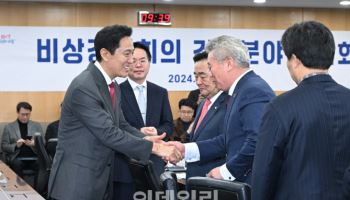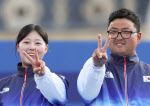4부에서는 한국시장에 성공적으로 진출한 선진 투자은행들의 CEO로부터 `성공적인 해외진출 전략`에 대해 들어보고 황건호 증권업협회장의 해외진출 지원 계획을 알아보는 기회를 마련한다. 또 증권사 국제담당 본부장들과 해외진출 현장을 다녀온 기자들이 `해외진출을 위해 보완해야 할 점`에 대해 토론하는 시간도 가졌다.
다음은 존 워커 한국맥쿼리그룹 회장(사진)이 한국 증권사의 해외진출에 도움이 되기를 바란다며 기고한 내용이다.
|
한국에서 맥쿼리 역사는 끊임없는 성공의 역사이며, 한국시장 진출을 노리는 외국금융회사들에게 좋은 본보기가 된다.
하지만 우리는 우리 자신을 외국계라고 생각하지 않는다. 필자는 한국 맥쿼리그룹의 회장으로서 맥쿼리의 13개 비지니스에 걸쳐 외국인 투자자보다 국내 투자자의 비중이 더 크며, 한국에 세금을 내고 고용하는 직원들 대부분이 한국인임을 말씀드릴 수 있다.
한국에서 맥쿼리는 두개의 인프라펀드, 주식파생과 ELW, IT장비리스, 상품선물, 증권 매매와 리서치, M&A및 금융자문, 두개의 REITs를 운영하는 부동산 사업 등의 비지니스를 갖고 있다.
한국에서 사업을 하기 위해서는 한국에 대한 헌신을 보여주어야 함을 알고 있었기 때문에, 맥쿼리는 지난 2000년 다섯 명의 직원으로 한국에 처음 진출했을 때부터 현지화 전략을 썼다. 신한금융그룹, 우리은행, 국민은행과 같은 국내 금융기관들과의 사업협력을 통해 맥쿼리는 한국에서 계속 성장하였고, 현재 13개의 비지니스와 93%가 한국인인 360명의 직원을 고용하고 있다.
우리의 여러 펀드들중 최근 주요 거래들에 참여했던 MKOF를 예로 들어 외국에 있는 모회사가 아닌 한국 투자자들에 의해 지배되는 사업체를 설립하고자 하는 맥쿼리의 의지를 보여드리고자 한다.
MKOF 자본의 96%는 국내투자자들로 구성되기 때문에 외국펀드로 보기보다는 한국펀드로 보는 것이 맞다. 이 펀드는 한국 법률에 의해 설립된 맥쿼리코리아오퍼튜니티즈운용(MKOM)에 의해 운용되며, 금융감독원에 등록되어 있다. 또한 MKOF의 투자자들은 MKOF 자산들을 소유하며, 원할 경우 투표권을 행사하여 운용사를 변경할 수도 있다.
이렇듯 우리가 하는 대부분의 비지니스가 한국 투자자들을 위한 일임에도 불구하고 외국계로 불리는 것은 매우 유감이다. 앞으로 10년간 필자의 주요 목표중 하나는 맥쿼리가 한국에서 진정한 국내 기업으로 인정받도록 하는 것이다.
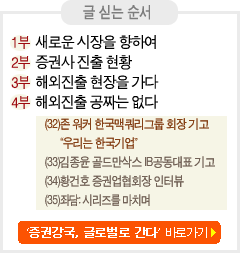 지난 2006년, 맥쿼리는 한국과학기술원(카이스트)에 미화 200만달러를 기부하여 경영대학원의 재원을 확충하는데 기여했다. 이는 아시아의 금융 중심지로서 한국의 미래에 대한 투자로 생각한다.
지난 2006년, 맥쿼리는 한국과학기술원(카이스트)에 미화 200만달러를 기부하여 경영대학원의 재원을 확충하는데 기여했다. 이는 아시아의 금융 중심지로서 한국의 미래에 대한 투자로 생각한다. 실제로 필자는 절반-한국인이라고 할 수 있다. 필자는 한국인과 결혼하였고 은퇴할 때까지, 어쩌면 그 후에도 한국에 살 계획이다. 가장 좋아하는 한국 음식은 된장찌개이고, 동동주의 유혹에 항상 무릎을 꿇는다.
필자는 한국의 우수한 음식 말고도 한국의 많은 것들을 높이 평가하고 있다. 특히 그 중에서도, 불과 10년 전 한국경제를 위협했던 금융위기를 한국인들이 슬기롭게 극복한 것을 존경한다.
한국은 경제위기 극복 이후 놀라운 발전을 이루어냈지만, 서울이 아시아 금융의 중심이 되기 위해 아직도 해야할 일들이 있다. 서울은 경쟁도시와 차별화할 수 있는 틈새 및 강점을 찾아서 발전시켜야 한다.
한국이 제3세계 국가에서 세계 13위의 경제 강국으로 탈바꿈 할 수 있었던 것은 기어코 일을 성공시키고야 마는 `빨리빨리` 정신에서 비롯되었으며, 이것이야말로 한국의 강점이라고 생각한다.
하지만 최근 들어 `빨리빨리` 접근방식이 오히려 부정적으로 인식되고 있는것 같아 조금 안타깝다. 필자는 좀더 현명하고 현대적인 `빨리빨리` 정신이야 말로 한국이 조금이라도 더 빨리 금융허브로 발돋움하게 할 수 있는 요소가 될 것이라고 믿는다.
한국은 빠르게 움직여야 한다. 아시아의 다른 지역들은 매우 빠른 속도로 세계 자본시장의 통로로 자리매김하고 있다. 그들을 따라잡기 위해 한국은 정책의 신속한 변화에 대한 거부감을 버려야 할 것이다.
필자는 한국이 아시아의 허브가 되기 위해서는 파생상품과 공매, 그리고 헤지펀드에서 틈새시장을 찾아야 한다고 생각한다.
낡고 종종 부정적으로 인식되는 `빨리빨리` 정신의 더 현명하고 현대적인 버전이 정치적인 리더십과 조화를 이룬다면 한국의 아시아 허브로의 도약은 더 신속히 성취될 수 있을 것이다.
사실 필자는 8년 전 자진하여 뉴욕 대신 서울을 선택해 왔고, 단 한 번도 후회해 본 적이 없다.
필자는 한국인들이 새로운 기회를 받아들이는 자세와 생산적인 기업들에 헌신하는 에너지를 사랑한다. 한국처럼 건설적인 변화를 받아들이는 다른 어떤 나라도 본 적이 없다.
필자는 한국에 도착하자마자 `맥쿼리 사업을 성장시킬 한국의 우수한 인재들을 고용할 수 있을 것이며 한국의 역동적인 경제는 맥쿼리가 사업을 성장할 수 있는 많은 기회를 제공할 것임`을 알 수 있었다.
맥쿼리는 한국 자산을 사고 그 자산에 가치를 더하여 한국경제 발전의 동반자가 되고 있다.
아시아에서 네번째로 큰 경제규모를 갖고 있는 한국에서 사업을 성장시키기 위해 맥쿼리는 통신, 미디어와 엔터테인먼트 분야에 대한 장기투자에 관심을 갖고 있다.
우리는 특히 통합하고 있거나 변화하고 있는 산업에 관심이 있다. 이것이 맥쿼리가 에너지나 설비분야, 미디어와 엔터테인먼트분야 등 통합되고 있는 분야를 선호하는 이유이다.
한국의 맥쿼리가 투자한 자산 규모는미화 150억 달러에 이른다. 또한 앞으로 2~3년 동안 약 미화 60억에서 100억 달러가 더 증가할 것으로 예상한다.
투자자들이 우리에게 투자하도록 하는 유일한 길은 그들을 대신하여 투자를 잘 하는 것 뿐이다. 우리의 투자자들은 우리가 거래를 설계하는 방법을 좋아하며, 우리의 투명성을 좋아한다.
투자자들은 또한 맥쿼리가 매우 신중하게 거래를 검토한다는 사실을 좋아한다. 우리는 자산에 과도한 투자를 하지 않도록 매우 주의를 기울인다.
맥쿼리는 한국에서 지속적으로 직원들의 고용을 늘려왔고, 자산들의 수익을 꾸준히 올렸다. 맥쿼리의 이런한 접근 방식은 앞으로도 변하지 않을 것이다.
우리의 투자 전략은 사업을 성장시키고 가치를 더하는 것이다. 맥쿼리가 한국에 진출한 것은 투자 후 이익을 갖고 떠나기 위함이 아니라, 한국 시장에 오랫동안 남아 있을 건실한 금융기관을 설립하기 위함이다.
Macquarie is a very well-known name in Australia, which isn’t surprising as it is Australia’s biggest investment bank. In Korea it’s becoming more familiar too, appearing more often lately in this nation’s newspapers, usually in connection with large M&A deals. It is viewed in the market as a rising force in the Korean investment banking scene, and I would say that its success is attributable largely to its deep ties with Korea and with Korean financial institutions.
Macquarie’s history is Korea is a story of unqualified success, and is a good model for foreign financial companies who seek to enter this market.
Actually though, we wouldn’t describe ourselves as foreign. As the Chairman of Macquarie Group of Companies, Korea, I can tell you categorically that we have more Korean investors across its 13 businesses than foreign ones, that we pays our taxes in Korea and that we hire mostly Korean nationals.
Macquarie’s businesses in Korea include two infrastructure funds, equity derivatives and equity-linked warrants businesses, IT leasing, commodity futures, securities sales and research, M&A and advisory, and a property business that runs two Real-Estate Investment Trusts (REITs).
We are aware that doing business in Korea means showing some commitment to the country, and that’s why Macquarie embarked on a strategy of localisation when we began our business here in 2000 with only five staff. By linking arms with major Korean financial institutions like Shinhan Banking Group, Woori Bank, and Kookmin Bank, Macquarie has been able to grow to comprise 13 businesses in Korea today, employing nearly 360 people – 93% of them being Korean nationals.
Take the example of one of our funds – Macquarie Korea Opportunities Fund - which has recently been involved in some major transactions, as proof of our commitment to building businesses which are controlled by their Korean investors rather than an offshore parent company.
Korean investors make up 96% of MKOF’s capital, which clearly makes it more of a Korean operation than a foreign one. The fund is managed by Macquarie Korea Opportunities Management, which was established under Korean legislation and is regulated by the Financial Supervisory Service. Additionally, MKOF’s investors own its assets, and they can replace MKOM as their money managers by a vote anytime if they so desire.
So it’s a bit unfortunate when people call us foreign when the vast majority of what we do is very Korean. Within 10 years one of my main goals is to make sure that we are fully recognized as a truly local institution.
In 2006, we put our money where our mouth is by donating KRW2 million to the Korea Advanced Institute of Science and Technology (KAIST) to help fund a Graduate School of Management. I see this as an investment in Korea’s future as an Asian financial centre.
Indeed, I could be described as half-Korean myself. I’m married to a Korean citizen, and I plan to live in Korea until I retires and possibly longer. My favourite Korean food is twenjung-chiggae, and I can’t resist a cup of dong-dong-ju.
In fact, there are many things I admire about Korea, not just the food. Foremost among these is the way Koreans have fought back from the financial crisis which rocked their economy just a decade or so ago.
Korea has made incredible progress since that time, but there’s still work to be done before Seoul can lay claim to being a regional financial center. Seoul needs to find a niche, an edge that differentiates it from rivals.
I believe Korea’s edge could be the so-called “bali-bali” mentality, the growth-at-all-cost approach that resulted in Korea’s rapid-fire transition from a Third-world economy to the world’s 13th largest economy today.
Korea should move fast. Other regional centers are rapidly positioning themselves as gateways for global capital. To catch up, Korea needs to throw off any aversion to moving quickly on policy.
I believe Korea could establish niches in derivatives and short-selling, and hedge funds, to become the Asian hub for these businesses.
This could be done reasonably quickly by channelling the old and oft-maligned “bali-bali” spirit into a smarter modern version teamed with political leadership.
I volunteered to come to Korea eight years ago, choosing Seoul over New York. And I’ve never regretted that decision.
I love the way Koreans embrace new opportunities, and the energy with which they commit to a productive enterprise. I don’t know of any other country that embraces constructive change like Korea.
On arriving here, I saw very quickly that I’d be able to hire exceptional local talent to take our business forward, and that Korea’s dynamic economy would provide us with great ways in which to grow our businesses.
Mr Walker points out that, through buying Korean assets and then adding value to their businesses, Macquarie is acting as a partner in the development of the Korean economy.
Through MKOF’s 49% stake in SK E&S we are helping to pump gas to 2.8 million households throughout Korea. Our other fund, the listed Macquarie Korea Infrastructure Fund, employs 44,000 people at its construction sites. What’s more, 324,000 people travel on MKIF roads every day.
Macquarie is interested in making long-term investments in Korea's telecommunications, media and entertainment industries in order to build its business further in Asia's fourth largest economy.
We're interested in industries that are consolidating, industries that are subject to change. That's why we like areas like media and entertainment, just as we like energy and utilities, which are also consolidating.
The total value of assets under management into which we have invested in Korea now stands at US$15 billion. I expect that rise by a further US$6 billion to US$10 billion over the next two years.
The only way investors give us their money is if we invest it well for them. They like the way we structure our transactions, and they like our transparency.
Investors also like the fact that we assess our transactions very carefully. We are very careful we don’t pay too much for an asset.
Macquarie has a track record of increasing the staff numbers and also profitability at assets it buys in Korea rather than seek cutbacks. That approach will not change.
Our plan when we invest is always to grow the business and grow the value. We haven’t come to Korea to invest and then leave. Rather, we’re here to build a strong institution that will last in this market for many years to come.
존 워커 한국맥쿼리그룹 회장
◇약력
한국맥쿼리그룹 회장
맥쿼리 재팬 리미티드 이사회 이사
호주한국경제협력위원회 회장
한국증권업협회 공익이사
정치학 석사, University of New England
Honor of Member of the Order of Australia(2000년)
산업자원부 대통령표창 (2004년)
대한민국 금융문화대상(2006년 8월)
외국인 최초 한국증권업협회 공익이사 선임 (2007년 6월)
| * 협찬 : |
| 삼성증권, 우리투자증권, 대우증권, 한국투자증권, 교보증권, 메리츠증권, 하나대투증권, 키움증권, |
| 굿모닝신한증권, 한화증권, 현대증권, 미래에셋증권, 대신증권, 동양종합금융증권, |
| 증권선물거래소, 한국증권업협회, 증권예탁결제원 |


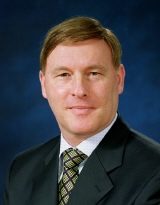
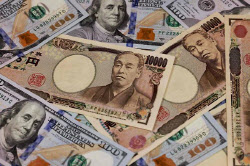

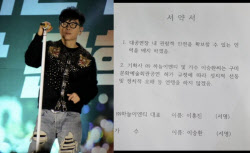


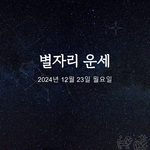
![[포토]은행권 소상공인 금융지원 간담회](https://image.edaily.co.kr/images/Photo/files/NP/S/2024/12/PS24122300609t.jpg)
![[포토]인사청문회 출석한 마은혁 헌법재판관 후보자](https://image.edaily.co.kr/images/Photo/files/NP/S/2024/12/PS24122300404t.jpg)
![[포토]아침 영하 10도, 꽁꽁 얼어붙은 도심](https://image.edaily.co.kr/images/Photo/files/NP/S/2024/12/PS24122300843t.jpg)
![[포토]스케이트 타는 시민들로 북적](https://image.edaily.co.kr/images/Photo/files/NP/S/2024/12/PS24122200317t.jpg)
![[포토]기름값 10주째 올라…전국 휘발유 평균 1652.2원](https://image.edaily.co.kr/images/Photo/files/NP/S/2024/12/PS24122200258t.jpg)
![[포토]크리스마스 분위기](https://image.edaily.co.kr/images/Photo/files/NP/S/2024/12/PS24122200248t.jpg)
![[포토]'서울광장 스케이트장 좋아요'](https://image.edaily.co.kr/images/Photo/files/NP/S/2024/12/PS24122000768t.jpg)
![[포토] 나인퍼레이드 캠페인](https://image.edaily.co.kr/images/Photo/files/NP/S/2024/12/PS24122000496t.jpg)
![[포토]더불어민주당 최고위원회의 개최](https://image.edaily.co.kr/images/Photo/files/NP/S/2024/12/PS24122000232t.jpg)
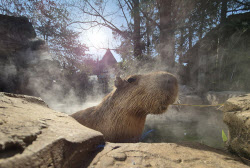
![[포토]안소현-김성태 본부장,취약계증 후원금 전달식 진행](https://spnimage.edaily.co.kr/images/vision/files/NP/S/2024/12/PS24121400036h.jpg)

